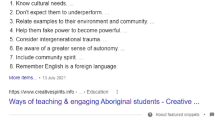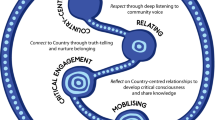Abstract
This paper examines the development of multicultural curriculum in Hong Kong and Taiwan over the last two few decades. Though both societies are broadly Chinese cultural contexts, differences in their political histories, cultures, and demographics nonetheless reflect disparate approaches to the development of multiculturalism in curriculum content. At the same time, Hong Kong and Taiwan both face tensions today related to competing priorities for cultivating local, national, and global senses of identity and civic participation. The paper concludes with recommendations for the further unfolding of multicultural curriculum in these societies in light of their local diversity issues, and with brief reflection on the potential of these findings to enrich traditional framings of multicultural education coming from western societies.
Similar content being viewed by others
References
Adamson, B., & Morris, P. (2014). Comparing curricula. In M. Bray, B. Adamson, & M. Mason (Eds.), Comparative education research: Approaches and methods (pp. 309–323). Hong Kong: Springer.
Appiah, K. A. (1994). Identity, authenticity, survival: Multicultural societies and social reproduction. In A. Gutmann (Ed.), Multiculturalism: The politics of recognition (pp. 149–164). Princeton: Princeton University Press.
Appiah, K. A. (2013). Does national education have a role to play in Hong Kong?. Hong Kong: University of Hong Kong Faculty of Law Hochelaga Lectures.
Banks, J. A. (2009). The Routledge international companion to multicultural education. London: Routledge.
Besley, T., & Peters, M. A. (2012). Interculturalism: Education and dialogue. New York: Peter Lang.
Cabestan, J. P. (2005). Specificities and limits of Taiwanese nationalism. China Perspectives, 62, 32–43.
Chan, K., & Yuen, L. (2011). Locals who are not considered local: Hong Kong’s South Asians. Hong Kong: Varsity.
Chen, G. X. (1996). The cultural studies of decolonialism. Taiwan: A Radical Quarterly in Social Studies, 21, 73–139.
Chow, Y. (2013). Racist Hong Kong is still a fact. Hong Kong: South China Morning Post.
Chui, C. (2011). Prejudice lurks even in 3-year-olds. Hong Kong: South China Morning Post.
Curriculum Development Council. (2001). Learning to learn—The way forward. Hong Kong: Education Bureau.
Curriculum Development Council. (2002). General Studies for primary schools curriculum guide. Hong Kong: Education Bureau.
Curriculum Development Council. (2007). Liberal Studies: Curriculum and assessment guide. Hong Kong: Education Bureau.
Damm, J. (2012). Multiculturalism in Taiwan and the influence of Europe. In J. Damm & P. Lim (Eds.), European perspectives on Taiwan (pp. 84–105). New York: Springer.
Doong, S. (2008). Taiwan’s new citizenship curriculum: Changes and challenges. In D. L. Grossman, W. O. Lee, & K. J. Kennedy (Eds.), Citizenship curriculum in Asia and the Pacific (pp. 43–60). Hong Kong: CERC.
Emerson, M (Ed.). (2011). Interculturalism: Europe and its muslims in search of sound societal models. Brussels: Centre for European Policy Studies.
Hue, M. T., & Kennedy, K. J. (2012). Creation of culturally responsive classrooms: Teachers’ conceptualization of a new rationale for cultural responsiveness and management of diversity in Hong Kong secondary schools. Intercultural Education, 23(2), 119–132.
Hue, M. T., & Kennedy, K. J. (2013). Creating culturally response environments: Ethnic minority teachers’ constructs of cultural diversity in Hong Kong secondary schools. Asia Pacific Journal of Education, 34(3), 273–287.
Hui, T. M. H. (2009a). Liberal Studies: Hong Kong today, book 1. Hong Kong: Hong Kong Educational Publishing Company.
Hui, T. M. H. (2009b). Liberal Studies: Hong Kong today, book 2. Hong Kong: Hong Kong Educational Publishing Company.
Hung, C. C., & Cheng, S. Y. (2008). Access and equity: Who are the students in Taiwan’s top universities? In D. B. Holsinger & W. J. Jacob (Eds.), Inequality in education: Comparative and international perspectives (pp. 290–306). Hong Kong: Springer.
Jackson, L. (2014a). Muslims and Islam in U.S. education: Reconsidering multiculturalism. London: Routledge.
Jackson, L. (2014b). Who belongs in what Hong Kong? Citizenship education in the special administrative region. In A. M. Kuntz & J. E. Petrovic (Eds.), Citizenship education: Global perspectives, local practices (pp. 22–42). New York: Routledge.
Jackson, L., & Shao, Y. (2013). Where are ethnic minorities in Hong Kong curriculum?. Hong Kong: Conference on Education, Ethnicity, and Inequality: Issues and Insights.
Kaeding, P. (2011). Identity formation in Taiwan and Hong Kong—How much difference, how many similiarities? In Schubert, G., Damm, J. (Eds.), Taiwanese identity in the twenty-first century century: Domestic, regional and global perspectives (pp. 258–279). London: Routledge.
Lam, J. (2014a). Democratic groups propose arrival tax of up to HK$100 to curb mainland visitors. Hong Kong: South China Morning Post.
Lam, J. (2014b). ‘Hongkonger’ makes it to the world stage with place in the Oxford English Dictionary. Hong Kong: South China Morning Post.
Lee, F. K. J., & Collins, P. (2010). Construction of gender: A comparison of Australian and Hong Kong English language textbooks. Journal of Gender Studies, 19(2), 121–137.
Liu, M. (2004). A society in transition: The paradigm shift of civic education in Taiwan. In W. O. Lee, D. L. Grossman, K. J. Kennedy, & G. P. Fairbrother (Eds.), Citizenship education in Asia and the Pacific: Concepts and issues (pp. 97–118). Hong Kong: CERC.
Loper, K. (2004). Race and equality: a study of ethnic minorities in Hong Kong’s education system. Hong Kong: Centre for Comparative and Public Law and Unison Hong Kong.
Manzon, M. (2014). Comparing places. In A. Bray & Mason (Eds.), Comparative education research (pp. 97–138). Hong Kong: Springer.
Mason, R. (2009). Problematising multicultural art education in the context of Taiwan. Compare: A Journal of Comparative and International Education, 39(4), 455–468.
Mayo, C. (2004). The tolerance that dare not speak its name. In M. Boler (Ed.), Democratic dialogue in education: Troubling speech, disturbing silence (pp. 33–49). New York: Peter Lang.
McCarthy, C. (1997). Uses of culture: Education and the limits of ethnic affiliation. New York: Routledge.
McInerny, D. M. (2010). The role of sociocultural factors in shaping student engagement in Hong Kong: An ethnic minority perspective. Hong Kong: Hong Kong Institute of Education.
Morris, P., & Adamson, B. (2010). Curriculum, schooling and society in Hong Kong. Hong Kong: Hong Kong University Press.
Parekh, B. (2000). Rethinking multiculturalism: Cultural diversity and political theory. Cambridge: Harvard University Press.
Peng, C. L., Huang, S. R. (2012). A study of gender ideology in Taiwan elementary school textbooks: Perspectives from textbook editors and reviewers. Chiayi, Taiwan: Philosophy of Education Society of Australasia Annual Conference.
Ravitch, D. (1990). Multiculturalism: E Pluribus Plures. American Scholar, 59, 337–354.
Schubert, G. (2004). Taiwan’s political parties and national identity: The rise of an overarching consensus. Asian Survey, 44(4), 535–554.
Sharma, A. (2012). Diverse education system: issues in non-Chinese education in Hong Kong. Comparative Education Bulletin, 14, 48–57.
Su, Y. C. (2006). Political ideology and Taiwanese school curricula. Asia Pacific Education Review, 7(1), 41–50.
Su, Y. C. (2007). Ideological representations of Taiwan’s history: An analysis of elementary social studies textbooks, 1978-1995. Curriculum Inquiry, 37(3), 205–237.
Sweeting, A. (1992). Hong Kong education within historical processes. In G. Postiglione (Ed.), Education and society in Hong Kong: Toward one country and two systems (pp. 339–382). Hong Kong: Hong Kong University Press.
Taylor, C. (1992). Multiculturalism: The politics of recognition. Princeton: Princeton University Press.
Waddington, D., et. al. (2012). Interculturalism in practice: Quebec’s new ethics and religious culture curriculum and the Bouchard-Taylor Report on reasonable accommodation. In T. Besley & M. A. Peters. (Eds.) Interculturalism: Education and dialogue (pp. 312–329). New York: Peter Lang.
Wang, Y. H. (2002). Limits of ethnic recognition: A preliminary analysis of multicultural competence of Aboriginal teachers on curriculum philosophy. Exeter, England: Annual Conference of the British Educational Research Association.
Wang, L. J. (2004). Multiculturalism in Taiwan: Contradictions and challenges in cultural policy. International Journal of Cultural Policy, 10(3), 301–318.
Wang, L. (2007). Diaspora, identity and cultural citizenship: The Hakkas in ‘Multicultural Taiwan’. Ethnic and Racial Studies, 30(5), 875–895.
Wu, Y. L. (2012). Sociocultural contexts and learning: Vietnamese immigrant women in Taiwanese vocational training programs. Chiayi, Taiwan: Philosophy of Education Society of Australiasia Annual Conference.
Yang, C. C. R. (2010). Gender stereotyping and gendered discourses in a Hong Kong primary English textbook series. Glossa, 5(2), 166–197.
Yao, Y., Buchanan, D. L., Chang, I. J., Powell-Brown, A., & Pecina, U. H. (2009). Different drummers: International perspectives on multicultural education. International Journal of Multicultural Education, 11(2), 1–17.
Yuen, C. Y. M. (2002). Education for new arrivals and multicultural teacher education in Hong Kong. New Horizons in Education, 45, 1–22.
Author information
Authors and Affiliations
Corresponding author
Rights and permissions
About this article
Cite this article
Jackson, L. Under Construction: The Development of Multicultural Curriculum in Hong Kong and Taiwan. Asia-Pacific Edu Res 23, 885–893 (2014). https://doi.org/10.1007/s40299-014-0199-9
Published:
Issue Date:
DOI: https://doi.org/10.1007/s40299-014-0199-9




